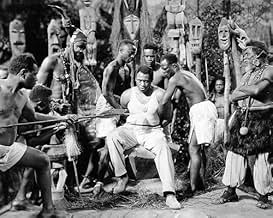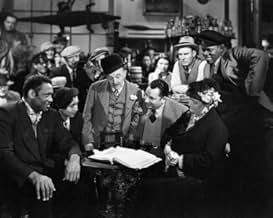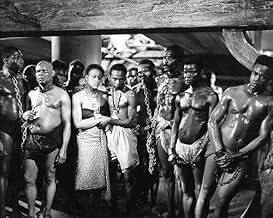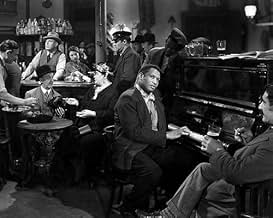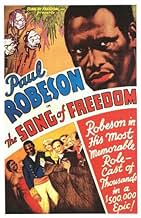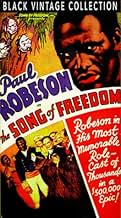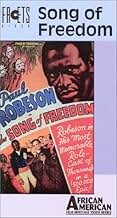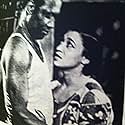Ajouter une intrigue dans votre langueA black British dockworker named Johnny Zinga becomes a famous singer and learns that he is the rightful king of the African island of Casanga.A black British dockworker named Johnny Zinga becomes a famous singer and learns that he is the rightful king of the African island of Casanga.A black British dockworker named Johnny Zinga becomes a famous singer and learns that he is the rightful king of the African island of Casanga.
- Réalisation
- Scénario
- Casting principal
Elisabeth Welch
- Ruth Zinga
- (as Elizabeth Welch)
Bernard Ansell
- Sir James Pyrie
- (as Bernerd Ansell)
Cornelia Smith
- Queen Zinga
- (as Miss C. Smith)
Sydney Benson
- Gate-Keeper
- (non crédité)
Cathleen Cavanagh
- Woman
- (non crédité)
Alf Goddard
- Alf, the Bartender
- (non crédité)
Avis à la une
This was a fairly good film dating back to 1936 from Hammer Productions in Britain. Starring Paul Robeson, whose extraordinary vocal talents are properly utilized. It's the story of a African-Briton living in England after slavery has been abolished in the European nation. He works on the docks and his one dream in life to discover his ancestry in Africa. His interest is fueled by a song that he sings often, be it to his wife or during his job on the docks. A song that he never learned, but as he would put it, was always inside of him. His amazing bass singing voice is over-heard by a theater yuppie and he is quickly recruited to the stage appearing in theatrical productions while utilizing his singing talents. After creating a fan following and with the help of some knowledge from a theater-goer, he decides to finally take the trip to Africa to find his "roots." Overall, the film is good, if not a bit too idealistic. But it doesn't harm the film's integrity and Robeson's great talent as both an actor and singer. Seeing how this film is not known well, I would recommend it. It's not a very long picture; it runs just under and hour and twenty minutes. So take some the time, and find this movie. If not for the film, then do it for Robeson's incredible vocal talents.***
10PWNYCNY
This movie is about how sheer chance and pure luck and can lead to fame and fortune. Paul Robeson is wonderful. His singing is comparable to that in the 1936 Show Boat, arguably the greatest musical ever made by Hollywood. Paul Robeson is such a commanding presence in this movie that without him this movie could not be made. Also the story is compelling as a man has a chance to fulfill his dream and in the process learn more about himself and his roots. Anyone who gives any thought to their own roots can relate to this movie. It's about a man's quest for cultural and spiritual fulfillment which this movie mots effectively portrays. Also impressive is Elizabeth Welch who plays Mr. Robeson's wife. A good story, well acted, excellent, inspirational songs, all combined to create a great movie.
Although no-one could call this a great movie, it is of compelling historical interest. At a time when Black people in the movies were servants or scoundrels, Paul Robeson portrayed a London dock-worker who is discovered by an impresario and launches a great singing career; after that, he goes to Africa to bring education and enlightenment to the tribespeople.
It's easy to be harsh on this movie; it shows the people of Africa as benighted savages in need of guidance (only this time they get it from Robeson, playing an Afro-cockney). The whole second half plays in tropical-adventure mode, with all the clichés of the 1930s.
But you have to realize that the film's sympathies are with the London dock-workers, black and white; it goes to great lengths to show them treating each other with friendship and respect, and this is the most notable part of the story. Everyone else is a caricature - the impresario, the aristocratic explorer, the witch-doctor, and so on.
Anyone who has a tolerance for 1930s films will quickly realize that this is much better than most of them, and is worth a look for many reasons, not the least is the opportunity to hear Robeson's great singing voice. One curious fact is that this is from Hammer Studios, which later became identified with horror films.
A must see for anyone interested in cinema.
It's easy to be harsh on this movie; it shows the people of Africa as benighted savages in need of guidance (only this time they get it from Robeson, playing an Afro-cockney). The whole second half plays in tropical-adventure mode, with all the clichés of the 1930s.
But you have to realize that the film's sympathies are with the London dock-workers, black and white; it goes to great lengths to show them treating each other with friendship and respect, and this is the most notable part of the story. Everyone else is a caricature - the impresario, the aristocratic explorer, the witch-doctor, and so on.
Anyone who has a tolerance for 1930s films will quickly realize that this is much better than most of them, and is worth a look for many reasons, not the least is the opportunity to hear Robeson's great singing voice. One curious fact is that this is from Hammer Studios, which later became identified with horror films.
A must see for anyone interested in cinema.
This Hammer Studio, from London, England which is famous for its horror films surprised me with this great film from 1936 starring Paul Robeson, (John Zinga) who works as a London dock worker and sings songs all the time besides having a great bass voice for the opera and is discovered by a great opera director and producer from London, England. John is always wanting to go to Africa where he came from, but he does not know exactly where he was born, but he still remembers a song which he heard when he was very young. One day John happens to sing this song on stage in an opera performance and this song is recognized by an Englishman who tells him where it comes from and also a charm which John wears around his neck which helped determine its origin. John also has a wife and they both visit this Island and try to introduce themselves to these people and that is when the story gets very interesting. Don't miss this great film from the past, it is a gem in the rough. Enjoy
Sure, the movie is dated in both technique and appearance. But it does have the great Paul Robeson in the central role as a dockworker and social equal of his white work mates. This is at a time when Blacks in American movies were reduced to either menials or buffoons. In terms of stereotypes, Robeson's non-demeaning role takes some getting used to. But try imagining that powerful presence and commanding voice in anything other than a dignified role. No wonder he was widely viewed as a threat to Jim Crow stereotypes.
Perhaps the film's most interesting aspect is what the Westernized Robeson can do for his benighted tribe of ancestors once he returns to them, uninvited. Sure, he can bring those sanitation and medical advances that will improve their collective health. The movie does a pretty good job of dramatizing that aspect, and we're all rooting for him to win out over the tribe's non-scientific methods and the witch- doctor power structure keeping them in place. But what happens after that. Of course, the movie stops at that point, so we don't know. But we do know another area of the continent has been opened to Western presence. The question then is whether Robeson will also bring in Western commercial interests, of much more dubious benefit than the proved health benefits, as history shows. After all, penicillin is one thing, Chevron is another. This remains a point to ponder now that the movie has set up the initial stage.
Despite its shortcomings (the outrageously fey Donizetti, for one), the movie remains an interesting artifact of its time, especially for Robeson's and other Blacks' acceptance into the white working class of London's docks. I'm sure the leftist Robeson found that labor- solidarity aspect particularly appealing. Then too, Elisabeth Welch delivers a fine natural performance as Robeson's loyal wife. We root for the two of them just as we would root for a courageous white couple. Above all, however, the film remains a chance to view one of America's noblest forgotten figuresthe great Paul Robeson.
Perhaps the film's most interesting aspect is what the Westernized Robeson can do for his benighted tribe of ancestors once he returns to them, uninvited. Sure, he can bring those sanitation and medical advances that will improve their collective health. The movie does a pretty good job of dramatizing that aspect, and we're all rooting for him to win out over the tribe's non-scientific methods and the witch- doctor power structure keeping them in place. But what happens after that. Of course, the movie stops at that point, so we don't know. But we do know another area of the continent has been opened to Western presence. The question then is whether Robeson will also bring in Western commercial interests, of much more dubious benefit than the proved health benefits, as history shows. After all, penicillin is one thing, Chevron is another. This remains a point to ponder now that the movie has set up the initial stage.
Despite its shortcomings (the outrageously fey Donizetti, for one), the movie remains an interesting artifact of its time, especially for Robeson's and other Blacks' acceptance into the white working class of London's docks. I'm sure the leftist Robeson found that labor- solidarity aspect particularly appealing. Then too, Elisabeth Welch delivers a fine natural performance as Robeson's loyal wife. We root for the two of them just as we would root for a courageous white couple. Above all, however, the film remains a chance to view one of America's noblest forgotten figuresthe great Paul Robeson.
Le saviez-vous
- AnecdotesPaul Robeson performs a scene from Louis Gruenberg's operatic version of "The Emperor Jones". He earlier had starred in Eugene O'Neill's original play on Broadway (1923) and in the film version The Emperor Jones (1933).
- Citations
Gabriel Donozetti: What's the matter the color of his skin, when he has color in his voice! Power! Beauty! I go fighting!
- ConnexionsFeatured in That's Black Entertainment (1990)
Meilleurs choix
Connectez-vous pour évaluer et suivre la liste de favoris afin de recevoir des recommandations personnalisées
Détails
- Date de sortie
- Pays d’origine
- Langues
- Aussi connu sous le nom de
- Un trono por una canción
- Lieux de tournage
- Société de production
- Voir plus de crédits d'entreprise sur IMDbPro
- Durée
- 1h 20min(80 min)
- Couleur
- Rapport de forme
- 1.37 : 1
Contribuer à cette page
Suggérer une modification ou ajouter du contenu manquant

